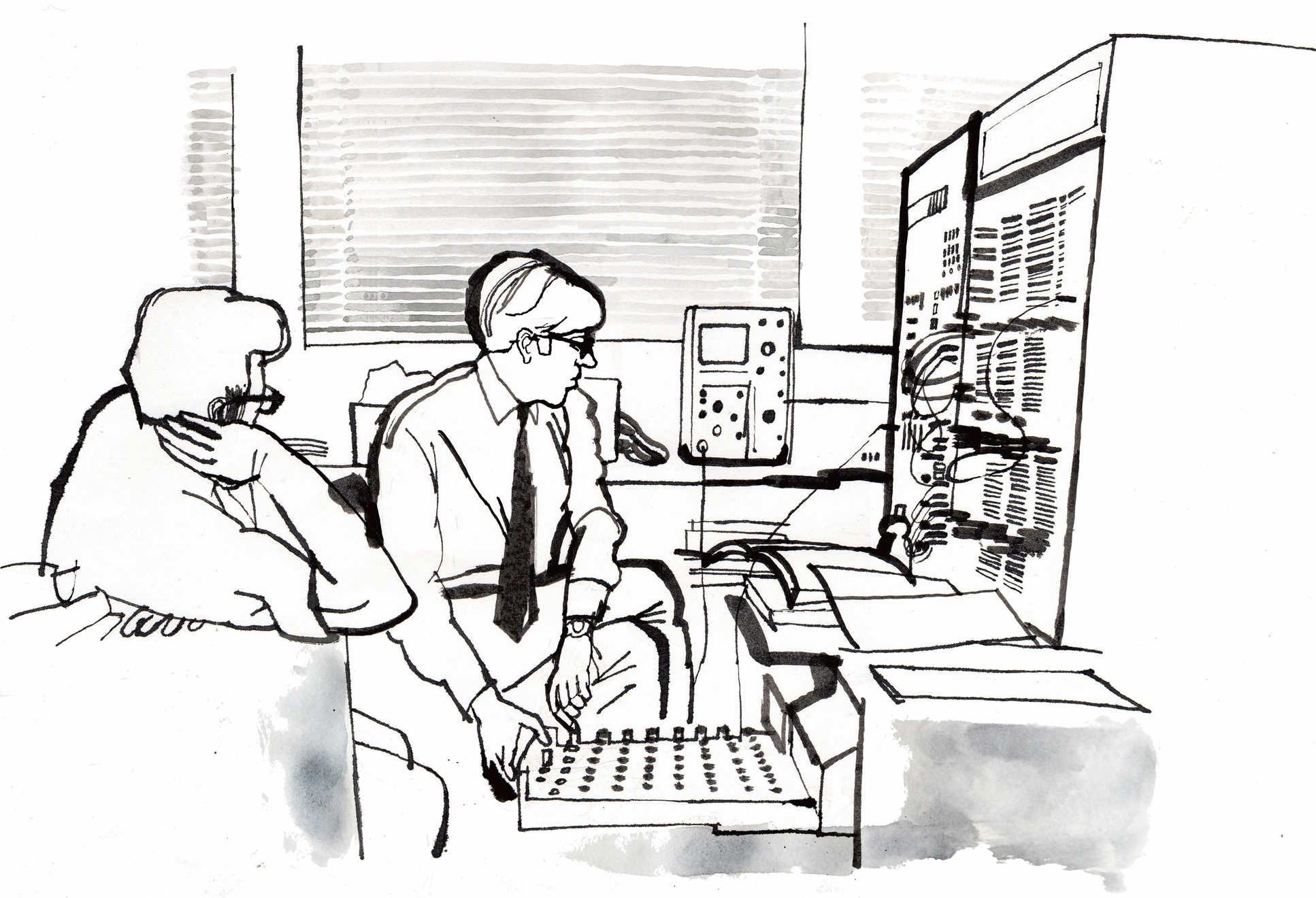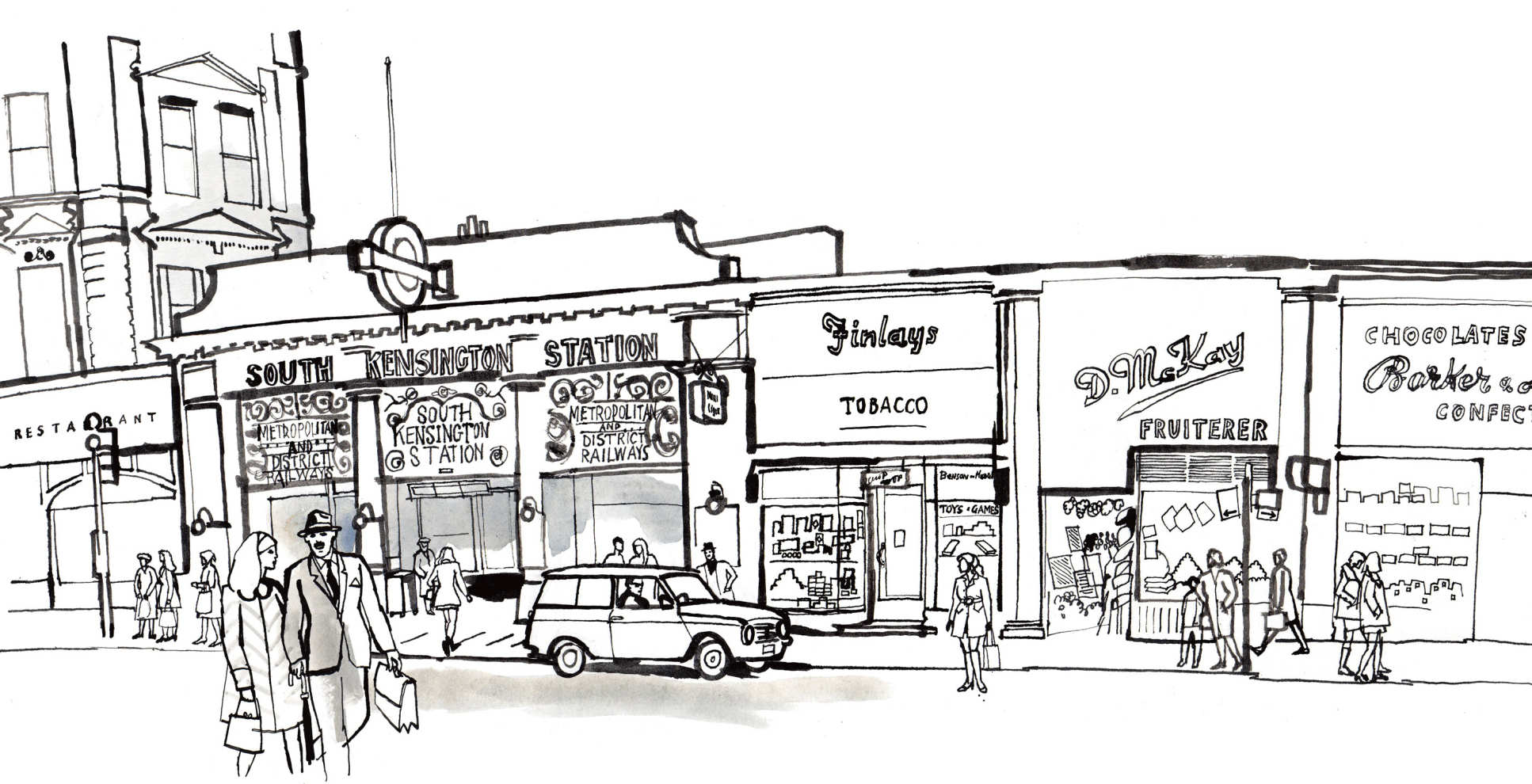“I said I’d waterski on the Thames. Everyone laughed. I had no idea how funny it was until I got to London and saw the river...”
How the Athlone Fellowship transformed the lives of a generation of Canadian engineers.

Words: William Ham Bevan / Illustration: Lucinda Rogers
When recalling the interview for the Athlone Fellowship wthat brought him to Imperial College London from Winnipeg in Canada, Neil MacKenzie (MSc Mechanical Engineering 1967) credits an unintended joke with sealing the deal. He says: “I was asked, ‘What would you do if you went to London?’ I said, ‘I’m going to waterski on the Thames.’ Everyone started to laugh. I had no idea how funny it was until I got to London and saw what the river was like.”
MacKenzie was one of 810 Canadian graduates to take part in the programme, aimed at bringing the country’s most talented young engineers to the UK for further training. Named in honour of the Earl of Athlone, Canada’s Governor General from 1940 to 1946, it was first mooted by Harold Wilson in 1949 to encourage trade and exchange expertise between the two nations.
The first cohort of Athlone Fellows was selected in 1951. Successful applicants had their passage to England funded, plus their tuition fees, and received a yearly travel grant within the UK, a textbook allowance and a modest weekly stipend (initially £6 10s – the equivalent of around £190 in 2018). They could choose to spend two years – or a single year in some cases – on a university research programme, an industrial secondment or a mixture of the two. The academic route proved most popular. By 1970, when the scheme was wound up, 754 fellows had spent all or part of their time at a British university. Imperial was by far the most sought-after destination, taking a total of 304.
The successful candidates were warned that they would experience culture shock when they arrived in Britain – “especially those, like me, who were living on the western side of the Rocky Mountains and had hardly been anywhere else,” says Gary Elfstrom (PhD Aeronautics 1971). He adds: “They didn’t just pick the highest-marked students as Athlone Fellows, because they might not cope with cultural differences. They were looking for more rounded applicants.”
For Bob Hemmings (PhD Chemical Engineering & Chemical Technology 1965), one of the first new experiences was the unfamiliar (and unwelcome) smell of kippers at Nutford House, where new fellows were temporarily billeted. A greater surprise was the extent of war damage still in evidence in 1962. He says: “Many areas of London had bomb-damaged ruins – blocks and blocks of devastation. It became more personal to me when I attended Remembrance Day at the Cenotaph. The war was still an open wound.”
Ian Rowe (PhD Electrical Engineering 1967) says: “Being married with young children, the culture shock was felt by my whole family. We had to find out that you used markets, not supermarkets, for groceries if you wanted value. We had to work out the health system and the language: if someone said, ‘I’ll knock you up at 7am tomorrow’, it didn’t mean they were going to bang me in the belly.”

Dealing with pre-decimal currency presented another challenge. Spruce Riordon (PhD Electrical Engineering 1967), who was six years into his career as a radar engineer when he applied in 1963, says: “They still had pounds, shillings and pence. If I had a substantial calculation to do, I’d switch back to Canadian dollars, work it out and convert back. The cars were very small – much smaller than ours – and rationing had ended not long before, so the quality of food was very uneven. But it was exciting to see London.”
Becoming part of an international community at Imperial was an education in itself. MacKenzie says: “One way the Athlone changed my life was by showing me I was living in a bigger world than Canada. One day I went to College and around seven of my colleagues weren’t there – they were Israeli, and they’d gone back to fight in the six-day war.”
When Murray Clamen (PhD Civil Engineering 1973) arrived at Imperial in 1970, there was political volatility in Canada, making for bittersweet memories of his first year. He says: “I went back to get married that winter and there was a serious crisis going on in Quebec. The FLQ [Quebec Liberation Front] had kidnapped the minister, Pierre Laporte and the British Trade Commissioner, James Cross. We later met him at an event, and he spoke about how difficult the situation had been for his family.”
The Athlone Fellows also had to adjust to big differences in academic culture, with British research degrees far less regimented than their North American counterparts. Riordon says: “In Canada and the States, you went through a series of examinations and presentations to work towards the point where you could proceed with the thesis. In Britain, you were just thrown in and had to sink or swim. It prepared you for independent research.”
Monique Frize (MPhil Electrical Engineering 1969), the second female Athlone, had little trouble in negotiating the male culture of Imperial. She says: “There hadn’t been many women at Imperial, but I never felt treated any differently from the men. Everyone was supportive, though Bill the technician would always find one of us Canadians frying the College power supplies – which we did because the wiring in Canada is different.”
Imperial’s engineering facilities were locked up outside office hours, leaving plenty of time for extracurricular activities. Bob Hemmings was introduced by another Athlone Fellow to the Victoria League for Commonwealth Friendship, a charitable organisation made up “mostly of ladies; they were very interested in people from the Colonies, and I’d be invited to speak to them about the history of Canada.” Through the League, he was able to get seats in the royal boxes of London theatres, including the Royal Albert Hall.
Frize also took advantage of inexpensive opera, ballet and concert tickets. “I’d been a bit of a Quebec separatist in Canada,” she says. “That ended very soon after I moved to London and attended the Last Night of the Proms. I was singing Rule, Britannia! as loudly as anyone in the hall. In the summer of 1968, I married an Englishman in Chelsea Registry Office. The years I spent in London and at Imperial remain unforgettable!”

But if there is one attribute that links all the Athlone Fellows, it’s a belief that their time at Imperial was pivotal. Elfstrom says: “Employers would see the fellowship and the Imperial PhD on my résumé, and doors would open. It was a tremendous start to my career. Though I didn’t end up as the rocket scientist I once dreamt of being, I still ended up in the high-tech aerospace field that grabbed me and never let go.”
Rowe says: “Athlone Fellows were expected to become leaders, and many of us did exert great influence in Canada. I wouldn’t call myself a captain of industry, but I think I met the criteria for leadership: learning to cultivate the skills and motivations of the people around me and bring the most out of them. And there was a camaraderie that has stayed with us. That’s a lifelong thing.”
In a measure of that comradeship, reunions took place last year in Toronto and Ottawa. More activities are planned, both as a means of renewing links and of exploring whether a similar programme could be brought back.
It’s a plan that appeals to Clamen, a member of the youngest group to benefit from the fellowship. He says: “The Athlone had a very significant impact on me, my wife, my family and my career – and it forged friendships that have gone on to this day. It was a special time in my life, and I’m very grateful that the scheme was created.”
GOOD FELLOWS
A total of 810 Canadians took part in the Athlone Fellowship scheme between 1951 and 1970, the majority (304) at Imperial, including:
Robert Leslie (‘Bob’) Hemmings read Chemical Engineering at the University of Alberta before coming to Imperial as an Athlone Fellow in 1962. He graduated with a PhD in the same field in 1965.
Neil MacKenzie, a Mechanical Engineering graduate of the University of Manitoba, won his fellowship in 1966. He chose to spend a year at Imperial, reading for a MSc in Operations Research and Management Science, and then taking up an industrial placement at the Birds Eye frozen-food division of Unilever.
J. Spruce Riordon came to Imperial in 1963 after completing a Master’s at McGill University, Montreal, and spending six years working on radar development at the National Research Council in Canada. He was awarded his PhD in Electrical Engineering in 1967.
Ian Rowe, a University of Toronto alumnus, was working for the guided missiles division of de Havilland of Canada when he accepted an Athlone ‘B’ Fellowship in 1964. He studied for a PhD in Automatic Control Systems at Imperial, successfully completing his studies in 1967.
Monique Frize (née Aubry) received a BASc in Electrical Engineering from the University of Ottawa in 1966. In 1967, she became only the second woman to win an Athlone Fellowship, electing to spend two years at Imperial on an MPhil programme in Electrical Engineering (Engineering in Medicine).
Gary Elfstrom, a graduate of the University of British Columbia in Vancouver, won his fellowship in 1968 and arrived at Imperial the same year. In 1971, he graduated with a PhD in Aerospace, Aeronautical and Astronautical Engineering.
Murray Clamen followed his undergraduate studies in Civil Engineering at McGill University with a PhD in Hydraulics at Imperial. He was part of the last cohort of Athlone Fellows to be selected.